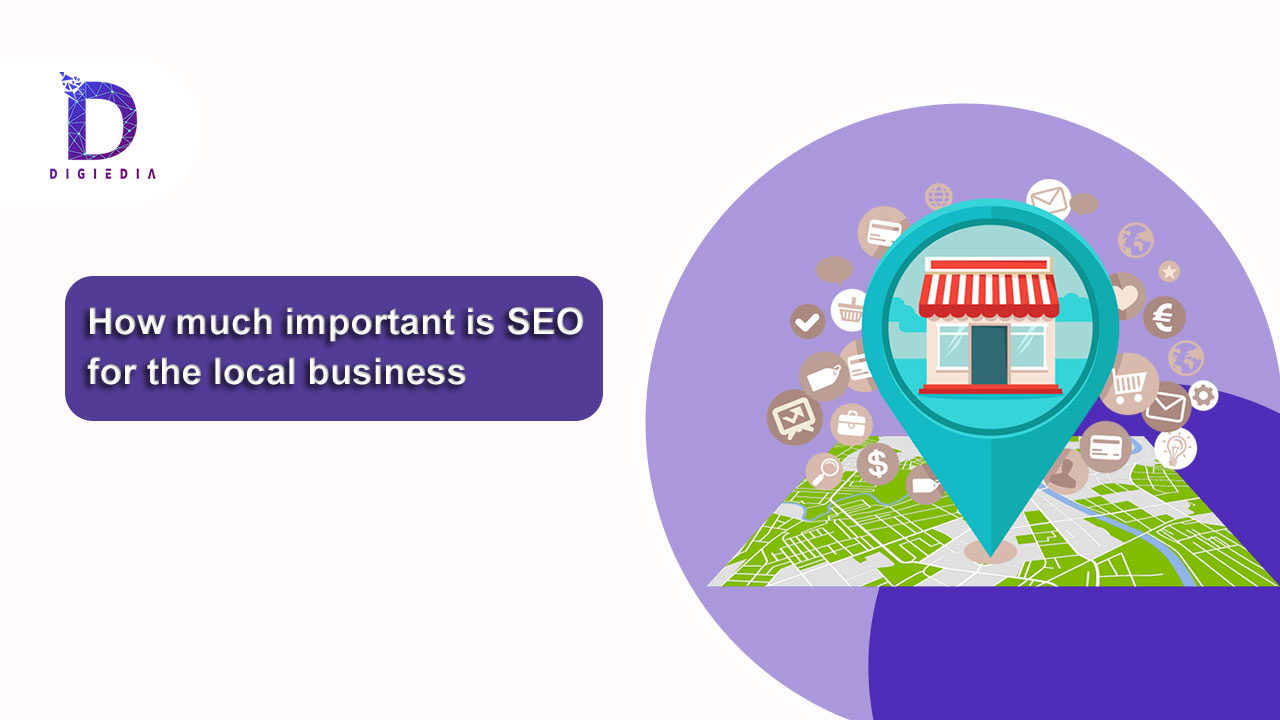
How Much Important is SEO for the Local Business
- DIGIEDIA
- Blogs, SEO (Search Engine Optimisation)
- 07 February 2022
- No Comments
Introduction
As a small businessman, you may consider SEO to be a waste of money. You might even assume that it isn’t worth the effort since SEO is dead – yet this is far from the case. SEO for the local business importance is always constantly expanding into new industries. It used to play a significant role for major and medium organizations. It is now equally important for small firms. SEO allows you to design a user-friendly website, identify and convert new customers, and establish your website’s credibility. To do anything like that, you must first grasp the interests and terminology of your target market. SEO for the local business can prove to be a game-changer and we will show you how.
Small businesses need SEO because if they don’t, they’ll be wasting money on content that will most likely go nowhere. In marketing, knowing who you want to reach is crucial. Your website is a pinpoint in a haystack without SEO. SEO, on the other hand, is dependent on more than just a small business’s blog and social profiles. Offline marketing has a significant impact on it as well. Social media comments, page visits, and other online engagements are all boosted by in-person or in-store interactions. Let’s see how much important is SEO for Local Businesses, and a few tips related to it.
Be aware of your target market.
Understanding of clients and what they want is required for good advertising or any advertising at all. Keyword research aids in the identification of popular queries. Then you may incorporate that desire into your material. SEO helps small companies and potential customers by directing traffic in the right direction. Potential clients will have an easier way of locating what they’re looking for if a company’s website is optimized. That might put your company ahead of a competitor, or at the very least bring up some unrelated search results. Yes, content is crucial, but it isn’t sufficient on its own. The content of a website is a vehicle that transports users from the Google terminal to Conversion-land or Customer-Loyalty-ville. And without keywords, information will be difficult to find.
Keywords
Keywords are terms or phrases typed into a search engine’s search bar. Volume, headers, image titles, and tags all help them out. To assist organize material and cater to search engines, change the phrasing and include relevant keywords. These phrases can be crucial in producing content if there is significant search volume. You’ll be better able to identify and relate to potential clients while also highlighting your small business if you know what keywords they’re employing. But be careful: using the same keywords over and again will only improve your SEO so far before it starts to backfire. A piece of content’s readability can be harmed by excessive repetition. Google also has a penchant for flagging websites for keyword stuffing. Make phrases that are appropriate and natural.
Developing your personal brand
To boost visibility, availability, and brand recognition, smaller companies must invest in their sites these days. Your website is an integral element of your team. Topics and terminology, when optimized, can attract a large number of visitors. This traffic is searching for identical phrases and landing on search engine results pages for specific purposes (SERPs). You establish authority and legitimacy by publishing material that adds to a certain community of interest. As a result, the content serves as your community’s voice. It not only attracts new customers, but it also establishes your company as a credible source and a constant in the discourse. Many small firms use this method to raise brand awareness.
Backlinking, engaging influencer marketing, and guest blogging are all examples of off-site strategies. Because it appears natural to consumers, off-site SEO is vital. It aids in the natural association of your brand with the market. Backlinking is the process of a group of websites linking to and endorsing one another. Increase the number of backlinks to your site from those other websites. This will improve your company’s reputation and drive traffic doorstep. Returning the favor is also a nice idea. Backlinking not only emphasizes your commitment to the community and study, but it also gives credit to the resources you use as well as your own thoughts. Getting published on a prominent blog or newspaper, or having a specialist published on your company’s blog, can also help to build authority.
Conversion and lead generation
The major advantage of SEO is the ROI (return on investment). Of course, it’s a financial commitment. Optimization necessitates the use of qualified personnel as well as a significant amount of time. Trying to keep up with SEO, algorithm tweaks, and keywords may be time-consuming and demanding. The optimization process is continuously changing, and marketers must adapt. Furthermore, SEO tactics cannot be effective for long periods of time. Strategies must be explored and discussed across a team, then tweaked and re-evaluated on a regular basis. The nutrition of a marketer are analytics. There is no plan without evaluating the success of specific pieces of material. Because of the ROI, small business people should not be frightened by the time commitment that marketing necessitates.
Experiential learning
The purpose of SEO is to improve the user experience. It doesn’t work the other way around. That’s why search engines’ algorithms are continuously evolving, and it’s crucial to stay on top of them. Users will be more engaged with high-quality material, which will help with a ranking that’s why SEO for the local business is important. Above everything, small business owners must ensure that their websites give a favorable user experience. User experience is measured by factors such as site performance and smartphone compatibility, according to Google. “You must go through me first,” Google basically says.
Conclusion
While many small-business owners appreciate the importance of search engine optimization (SEO), they lack the skills or resources to carry out all of the necessary steps to optimize their website for search. At the very same time, most new enterprises operate on a shoestring budget when it comes to digital marketing. The reasons why SEO for the local business is such a beneficial marketing approach are listed above, along with a few SEO suggestions that small companies should follow to maximize their search efforts.
